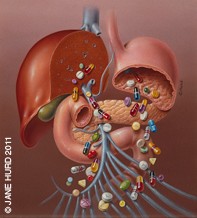Peer Reviewed
Feature Article Hepatology
Drug-induced liver injury. What would a liver doctor do?
Abstract
Drug-induced liver injury is a significant cause of morbidity. Practical management strategies for suspected drug-induced liver injury, including useful investigations and appropriate referral, are proposed in this case-based article.
Key Points
- Drug-induced liver injury (DILI) is a significant cause of morbidity and can lead to liver failure.
- Few of the more than 300 agents implicated as possible causes of DILI are associated with a frequency of drug reactions greater than 0.1%.
- The agents most often responsible in DILI are those most commonly prescribed (i.e. antimicrobials, NSAIDs and anticancer drugs). Generally, the agent started most recently is the most likely culprit.
- Diagnosis is vital as continued drug ingestion after onset of liver injury is a critical factor for poor prognosis.
- Patients are often unaware of the toxicity of large quantities of paracetamol.
- Statins rarely cause liver injury.
- The long-term risks of liver complications from methotrexate treatment should be weighed against the benefits of therapy.
Purchase the PDF version of this article
Already a subscriber? Login here.

